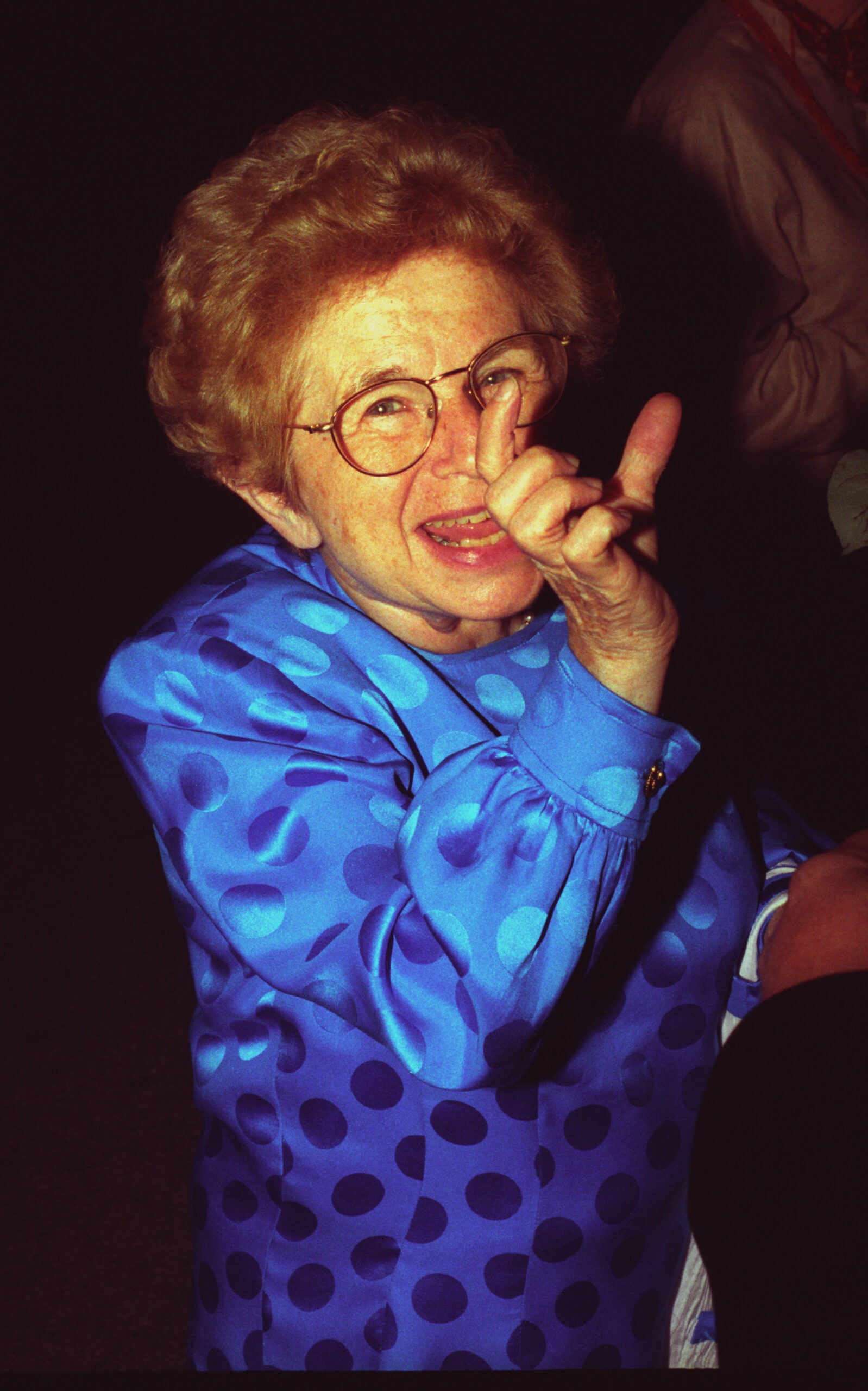
Dr. Ruth Westheimer, perhaps making the point that size doesn’t matter after all.
With the news cycle loaded with dynamite stories particularly around the political environment, you’re excused if you missed the obit about the passing of Ruth Westheimer last week at the age of 96. Her radio show, had a 10-year run from 1980 to 1990, which means many people who read this blog never heard her truly groundbreaking broadcasts.
Today’s #TBT post was originally written in 2015 as part of our “Radio’s Most Innovative” (trophy pictured) series. When we originally came up with the idea for “RMI,” the concept was to showcase a true broadcasting innovator every week which at the time seemed like a tall order. We started making lists of who we might honor, and Dr. Ruth’s name was on every one of them.

Jacobs Media’s coveted “Radio’s Most Innovative” trophies
If you regularly read these posts, you know there’s a special place in my radio heart for broadcasters, shows, and concepts that are different – that bend the rules and make radio a more interesting place. There must have been something in the water back in those days because other shows broke their share of ground during that same era of radio. On the public radio airwaves, it was “Car Talk” debuting in 1977 featuring two wiseacre New England auto mechanics jawing about cars and life. It made about as much sense on NPR news stations as Dr. Ruth did a couple years later.
It is not about whether radio was better (or not) back then. It is about thinking out of the box or the cheese room or whatever in the quest to make memorable, entertaining radio that may not sound like everyone else. Whether it’s Howard Stern, Paul Harvey, Alison Steele, Alan Almond, or Jacky Bam Bam, radio has always been a more interesting medium when it stops duplicating itself and trying to achieve “scale.” Doing the same thing everywhere may save lots of money, but it doesn’t make radio history nor does it inspire audiences.
It also won’t change the course of where radio is headed. No trophies will be handed out anymore for radio that sounds the same as it ever was. If the medium is to ever regain its long lost mojo, it will need to perform more “Westheimer Maneuvers” to save itself.
It often pays to be different, to stand out, to be original. And if it makes you feel better, Dr. Ruth would surely approve. – FJ
March 2015
We’ve been showcasing innovators here in this space since last August, without a single sexual reference – until now. Sexually Speaking, featuring the most unlikely radio talent of all time – Dr. Ruth Westheimer – took on historic mores and standards in radio broadcasting – and turned them on their side. The story behind this innovative concept is an amazing example of risk-taking and being in-sync with a changing America.
It was the dawn of the ‘80s – and a new era in American sexual freedom. And of course none of that was on the radio. In September of 1980, WYNY, an Adult Contemporary station in New York City made the move, launching a 15-minute pre-recorded segment that aired on Sunday nights after midnight.
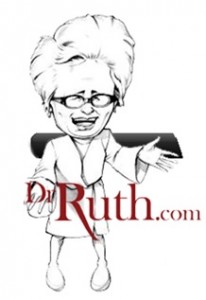 They called it “Sexually Speaking” featuring a German immigrant who had lived in Switzerland, Israel, and France before coming to the United States in 1956. Dr. Ruth Westheimer did not have a classic radio voice, but she had the expertise, the candor, and a disarming personality that made her a radio star. In a truthful, direct, and entertaining way, she truthfully answered blunt and honest questions about sex and sexuality that WYNY listeners called in.
They called it “Sexually Speaking” featuring a German immigrant who had lived in Switzerland, Israel, and France before coming to the United States in 1956. Dr. Ruth Westheimer did not have a classic radio voice, but she had the expertise, the candor, and a disarming personality that made her a radio star. In a truthful, direct, and entertaining way, she truthfully answered blunt and honest questions about sex and sexuality that WYNY listeners called in.
It was compelling radio. I remember being in a bar in New York City one night when Sexually Speaking came on. The bartender tuned in WYNY and patrons listened to Dr. Ruth like it was an important Yankees game.
Within a year, Sexually Speaking became so popular it was expanded into a daily one-hour live call-in show. National syndication soon followed and America was introduced to the charming, irrepressible, and transparent Dr. Ruth.
She would become a household word and pop-culture icon, talking candidly about topics that just weren’t discussed anywhere near as openly as they are in today’s Internet culture. She went on to host her own TV show, write a syndicated newspaper column as well as 35 books and much more. Today, she has adapted to the digital age with her own website and a robust Twitter following.
Far from a traditional radio host, Westheimer was an Israeli freedom fighter and a kindergarten teacher before a job with Planned Parenthood started her down the path to where she is today. That experience led to furthering her education in human sexuality studying under Dr. Helen Singer Kaplan at New York Hospital-Cornell University Medical Center and later participating in the program for five years as an Adjunct Associate Professor.
Before there was Dr. Phil, Dr. Laura, or Dr. Drew, there was Dr. Ruth, blazing new trails in sexuality in media that paved the way for a host of radio talk shows and TV reality programs.
She was kind enough to take the time to answer some questions about the unexpected success of her show and what it was like talking about human sexuality on the radio at that time.
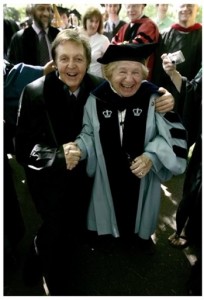 JM: What did you think when you were first asked to do a weekly radio show about sexuality?
JM: What did you think when you were first asked to do a weekly radio show about sexuality?
DR: I was interested in communicating the knowledge that I had learned in becoming a sex therapist to as wide an audience as possible, though never did I dream that 15 minutes of answering written questions would develop into a 10 year, two-hour live radio show.
JM: Did the positive audience response surprise you?
DR: I certainly knew people were curious about sex and that I was well trained, but I never expected my show to become so popular, particularly as it was so short, fifteen minutes, and so late at night, 12:15.
JM: As the show grew, what sort of hurdles did you have to overcome and how did you do it?
DR: I wasn’t trying to titillate. I was disseminating scientifically validated information gathered by people like Kinsey, Masters & Johnson and the woman who trained me, Helen Singer Kaplan, so I didn’t have any hurdles once the show got on the air.
JM: At what point did you know you had a success on your hands?
DR: One afternoon there was a blind man begging on the street and I dropped a few coins in his cup saying something like, “Go buy yourself some lunch.” When he answered me, “Thank you Dr. Ruth,” because he had recognized my voice, then I knew that I had made it.
JM: How did your unique style – so frank and honest – come about? Was it natural or something you cultivated over time?
DR: That came naturally because of my experience for many years of teaching Human Sexuality courses and from doing psychosexual therapy.
JM: When the show was first syndicated, did stations immediately embrace the idea or was it a hard sell?
DR: It went across the country without much difficulty. I just had lunch with Frank Osborn, who was the station manager, and he told me that NBC made a lot of money off my show. That’s something I didn’t know at the time.
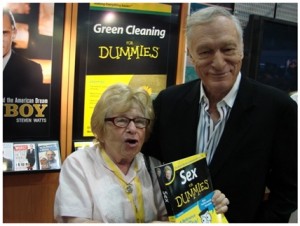 JM: Information about sex is much more widely available than ever before. Is there still a need for a show like Sexually Speaking?
JM: Information about sex is much more widely available than ever before. Is there still a need for a show like Sexually Speaking?
DR: Yes, there still is a need for a variety of reasons. First, there are new young people going through puberty and still not getting good sex education in their school or at home. And then there is always new scientific information being announced. And while teenage pregnancies have gone down, unintended pregnancies still take place, so the need for information about contraception is still there.
And I still get lots of questions, such as from my Twitter feed, @AskDrRuth, where I have 86,000 followers. So yes, people still have questions.
JM: Based on your experience, can you speak to the power of radio as a medium for communicating and entertaining?
DR: When I had my show, people didn’t have access to all the cable TV stations we have now or the Internet, so radio’s power was invaluable to me to spread the information I wanted people to have. I had a great time slot, just when people were getting into their cars; in fact, many planned their trip around my show.
Also, kids were just getting Walkmen, so they could listen in privacy via headphones, maybe under the bed covers. Privacy was important to me then and continues to be today. I am against people airing their dirty laundry on TV where everyone knows who they are, and that notoriety is likely to make their problem worse. But on radio, people can ask any question and maintain their anonymity. That aspect of radio makes it so powerful.
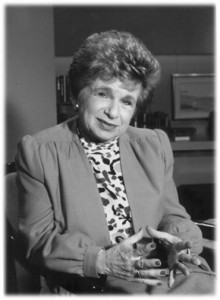 JM: What suggestions do you have for radio hosts trying to talk about a sensitive subject?
JM: What suggestions do you have for radio hosts trying to talk about a sensitive subject?
DR: Take the subject matter seriously. In the case of sexual matters, they don’t have to be a sex therapist, but they should be sexually literate and sensitive about this important subject.
JM: Your show was so innovative at the time, what advice do you have for someone with an idea of their own that doesn’t know how to get started bringing it to fruition?
DR: You have to be realistic, check the market of what is needed and not to give up on an innovative idea.
JM: Is there one truly amazing story from the radio show that you can share with us?
DR: I must have prevented many unintended pregnancies by talking about condoms and contraception.
Another important message I gave to homosexuals, in addition to treating their sexual orientation with respect, is that I would tell them that people, especially young people, shouldn’t come out if it does not fit into their religious or social background but that they should find other ways to follow their inclination. I’m thinking of one specific high school student who told me that he couldn’t tell his parents that he feels sexually attracted to other boys, and I said to him to finish high school then go to a large university where they have groups for people of different sexual orientation and then go to a large city where he would also find a thriving gay community. I met this young man in NYC some years later and he told me the advice I gave him on the radio saved his life.
Thanks to Mike Stern for his writing expertise for this week’s “Radio’s Most Innovative.”
INNOVATION QUOTE OF THE WEEK
“You can have brilliant ideas, but if you can’t get them across, your ideas won’t get you anywhere.”
Lee Iacocca
Originally published by Jacobs Media









